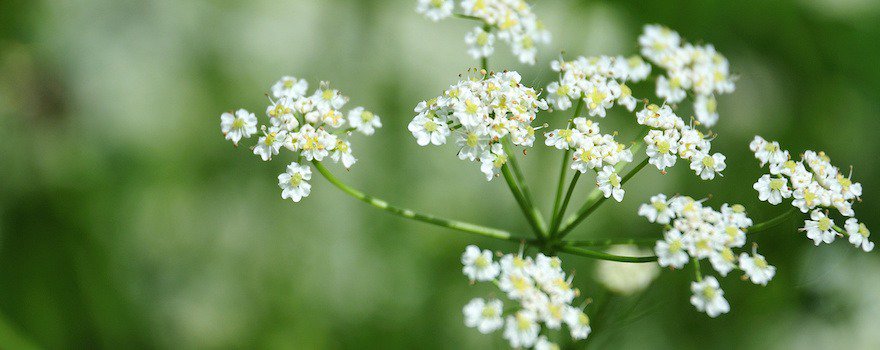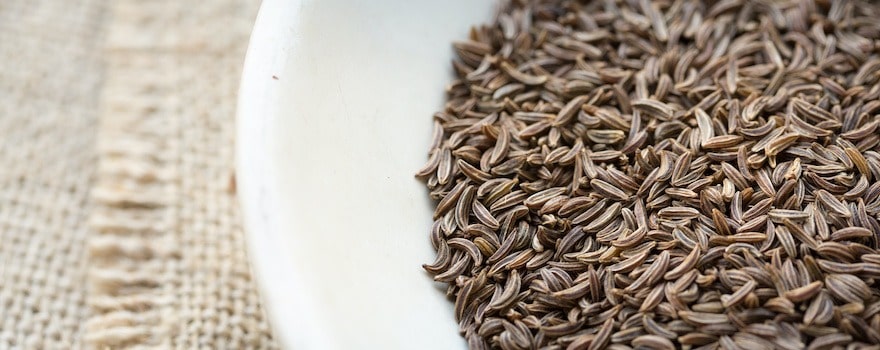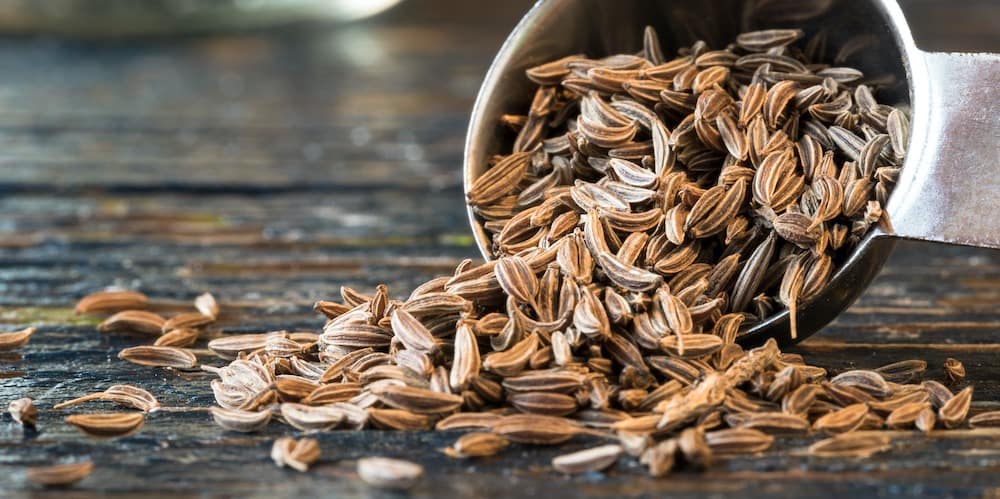BENEFITS OF CARAWAY
✓ Improves digestion
✓ Helps with weight loss
✓ Fights bacteria
✓ Helps manage diabetes
✓ Reduces cholesterol levels
What is caraway?
Caraway, whose scientific name is Carum carvi, is a herbaceous plant in the Apiaceae family, like dill, parsley, or celery. Also called ‘meadow cumin’ or ‘Vosges anise’, it has long been appreciated in cooking for its flavor. Indeed, its fragrant seeds have a pleasant aniseed flavor.
It grows in many regions of the world with a temperate climate. It is found from Africa to Asia, across Europe (France, Portugal, Germany…). The plant blooms from July to August. Its white flowers, grouped in umbels, then give way to dark brown, aromatic seeds. Once harvested, they are used as a condiment but are also consumed for their health benefits.
The use of caraway as a medicinal plant dates back to antiquity. The seeds were used in many traditional medicines and notably that of Persia (Iran).
They contain valuable compounds including essential oils, proteins, fiber, vitamins and minerals.
Today, its seeds are recognized for improving digestion and relieving gastrointestinal disorders. Consuming them also helps with weight loss, fighting bacteria, managing diabetes, and reducing cholesterol levels.
Caraway seeds are so fragrant that they are used to flavor certain traditional beverages. In Scandinavian countries, for example, they are combined with anise and fennel to make the Aquavit spirit. They are also used to make Brennivín, an Icelandic alcoholic beverage, or the famous schnapps of the Germanic countries.
Nutritional composition
- Acides aminés
- Vitamines : A, B1, B2, B3, B6, B9, C, E
- Minéraux et oligo-éléments : fer, calcium, potassium, magnésium, phosphore, sodium, zinc, cuivre, manganèse, sélénium
- Protéines
- Fibres
- Lipides
- Glucides
- Huiles essentielles : limonène, pinène, carvone, carvéol
- Actifs antioxydants : stérols

Benefits of caraway
♻️ Improves digestion
Caraway supports digestive functions and relieves difficult digestion after a meal. At the same time, it reduces associated discomforts such as bloating, gas, and spasms.
This effect is due to the essential oils contained in the seeds. Also present in peppermint and dill, carvone is an active compound with carminative and spasmolytic effects: it absorbs intestinal gases and relieves abdominal pain.
It also contains limonene, which promotes bile production and digestive enzymes. It also acts on gastric motility to optimize the digestive process.
This review by the pharmaceutical company TabibDaru of Kashan (Iran) examined the effect of caraway on relieving digestive disorders (dyspepsia).
🏃🏻♂️ Helps with weight loss
Consuming caraway seeds may be beneficial for weight loss. Indeed, they possess slimming properties and exert a natural appetite-suppressant effect to limit snacking during the day.
They also increase feelings of satiety and reduce body fat around the waist and thighs. Finally, by aiding digestion, they help maintain a flat stomach.
This study from the University of Malaya (Malaysia), conducted in overweight patients, shows the anti-obesity effect of caraway.
🦠 Fights bacteria
Like the seeds of nigella, those of caraway are antibacterial and fight certain pathogenic bacteria. They have proven particularly effective against Staphylococcus aureus and the bacterium Escherichia coli.
The seeds inhibit the development and proliferation of these bacteria. Again, it is the essential oils they contain (limonene and pinene) that are responsible for this action.
This study from Ferdowsi University of Mashhad (Iran), conducted in the laboratory, shows the antibacterial activity of caraway.
🍭 Helps manage diabetes
Caraway seeds can be a valuable aid in cases of type 2 diabetes. Indeed, they contain carveol, a liquid compound with antidiabetic potential.
In addition to lowering blood glucose, carveol reduces the level of glycosylated hemoglobin. This protein is responsible for capturing sugar in the blood. Its high level is an important marker of diabetes.
This study from Riphah International University (Pakistan), conducted on rats, shows the antidiabetic activity of caraway.
🍳 Reduces cholesterol levels
Caraway seeds have a hypolipidemic effect, that is, they normalize blood lipid levels (triglycerides and cholesterol).
On the one hand, they reduce triglyceride levels. When present in excess, these fats are responsible for cardiovascular diseases. On the other hand, the seeds lower the level of “bad” cholesterol (or LDL cholesterol) and increase that of “good” cholesterol (or HDL cholesterol).
This study from the Maharashtra University of Health Sciences (India), conducted on rats, shows the lipid-lowering action of caraway seeds.

How to consume caraway?
Caraway seeds
Often confused with cumin seeds, caraway seeds are also used as a spice but have a milder taste. They have a fresh, lemony and anise-like flavor.
Once crushed, they can flavor many dishes, both savory and sweet: meats, vegetables, sauces, cheeses, citrus fruits, breads and cakes… They pair very well with Eastern recipes such as harira (a traditional Moroccan soup) and harissa. These seeds are also useful for flavoring herbal teas and infusions.

Consume sustainably: choose local, fair-trade, and organic caraway
The Netherlands, Poland and Hungary are the main producers of caraway. But it is also cultivated in Russia, Egypt and India. In France, it adapts well to the climate of metropolitan France. It is a hardy plant, easy to cultivate and generally appreciated by producers of aromatic herbs.
If you can, prefer caraway grown in France and organic farming. There are also fair trade channels that support the work of small producers.
Dosage
It is recommended to consume no more than 5 g of caraway seeds per day.
Contraindications and side effects
Its consumption has some contraindications :
- Par mesure de précaution, on le déconseille aux femmes enceintes et aux jeunes enfants ;
- Les personnes souffrant d’une maladie hépatique doivent éviter d’en consommer.
Consumption of caraway has certain side effects :
- Maux de tête
- Réaction allergique
If you experience side effects, stop taking it and consult a doctor.
Report compiled by Julia Perez
Sources and scientific studies
Mohaddese Mahboubi, 2018. Caraway as Important Medicinal Plants in Management of Diseases.
Mahnaz Kazemipoor, Sareena Hamzah, Majid Hajifaraji, Che Wan Jasimah Bt Wan Mohamed Radzi, Geoffrey A Cordell, 2016. Slimming and Appetite-Suppressing Effects of Caraway Aqueous Extract as a Natural Therapy in Physically Active Women.
Mohammad Mohsenzadeh, 2007. Evaluation of antibacterial activity of selected Iranian essential oils against Staphylococcus aureus and Escherichia coli in nutrient broth medium.
Muhammad Shabir Ahmed, Arif-Ullah Khan, Lina Tariq Al Kury, Fawad Ali Shah, 2020. Computational and Pharmacological Evaluation of Carveol for Antidiabetic Potential.



